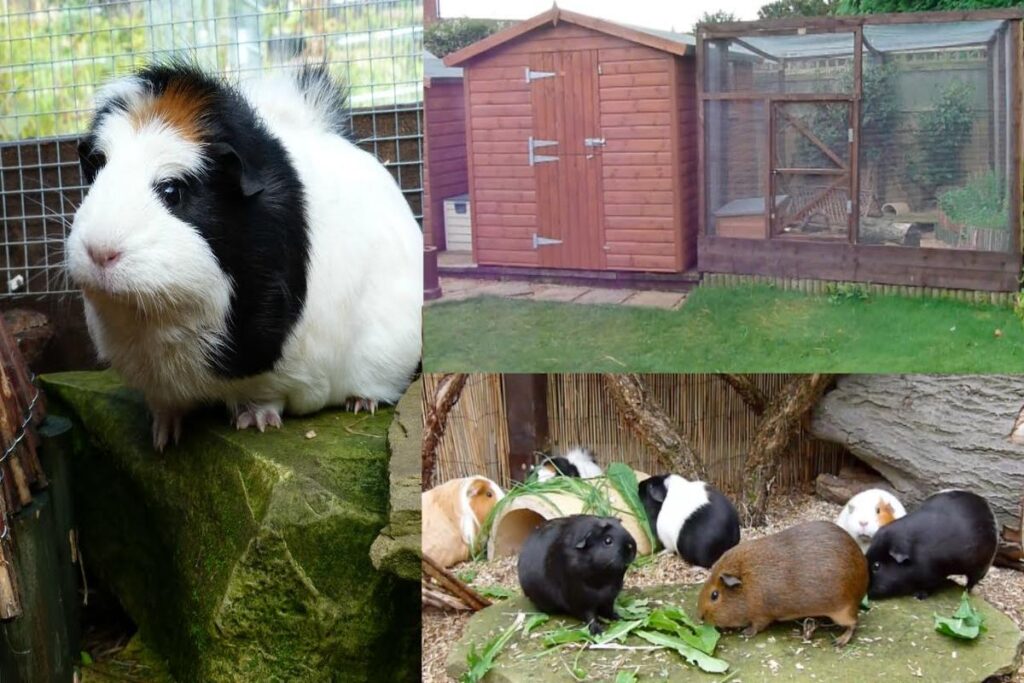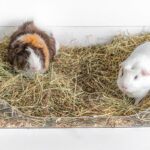Guinea pigs kept outdoors should be in groups of at least three or four. Location: Near the house (in sight); half in shade, half in the sun; rainwater must be able to drain away. Size: Here the general rule is ‘the bigger, the better’. Two to three animals need at least 8 m² .
Can Guinea Pigs Live Outside All Year Round?
Keeping your guinea pigs warm outside in winter is very important. Their hutches should be protected so the wind, rain, snow or sleet can’t blow in. If possible, the guinea pig hutch should be moved inside ashed, conservatory or unused garage during the winter or if the weather’s particularly bad.
Can I Leave My Guinea Pigs Outside?
Outdoor accommodation: if you’re keeping your guinea pigs outside, their hutch should be sheltered from direct sun and direct wind. In temperatures below 15°C, you should move them indoors. They’ll also need sufficient bedding throughout the whole enclosure to keep them warm.
Are Guinea Pigs Ok In The Cold?
Our small pets feel the cold too, even if they’re used to living outside. Guinea pigs originally came from the mountains of South America – their ideal living temperature is between 15-20 degrees, similar to our own. Guinea pigs are sensitive to the cold and can become unwell if they get too chilly.
Are Guinea Pigs Ok In The Rain?
If your guinea pigs have access to the outdoors, it’s important to be careful in bad weather. Their bodies are very low to the ground and they can get cold and dirty on their bellies. Make sure their exercise area doesn’t get too wet or muddy and avoid any hard or cold surface that might hurt or damage their feet.
Should You Cover A Guinea Pig Cage At Night?
While cage covers can provide asense of security and protection in certain situations, they may be unnecessary in well-designed and appropriately located cages. If the cage is already in aquiet and safe area, and your household environment is generally calm, the need for acage cover may be minimal.
Can You Leave Guinea Pigs Overnight?
The length of time you can leave your guinea pig alone depends on several factors such as their age, health, and whether or not they have companionship from other piggies. For healthy adult guinea pigs with cavy companionship, it is generally safe to leave them alone for about 24 hours.
How Long Can Guinea Pigs Live Outside?
Yes, Guinea Pigs can live outside all year long, however, if you choose to keep your piggy outside during the winter, you must ensure his hutch is protected from the cold, wind and rain.
Can Guinea Pigs Wear Clothes?
Wearing clothing is not natural for aguinea pig. The act of dressing them will most likely cause stress, not to mention how they will feel when dressed. They won’t be accustomed to having apiece of clothing wrapped around their body and it will feel strange.
Do Guinea Pigs Get Thirsty?
On average guinea pigs will drink 10-15 ml/100 g/day, so alarge 1 kg guinea pig will normally drink up to 150 ml each day, so anything over that could be abnormal.
Can I Bring My Guinea Pig Outside?
Guinea Pigs Going Outside FAKs – Frequently Asked Kavees Guinea pigs are most comfortable in mild temperature of around around 60-73°F (16-23°C). Ideally, you should avoid giving your guinea pigs outdoor time when the temperature drops to and below 60°F/16°C as that would be too cold for them.
What Do You Do If A Guinea Pig Bites You?
Should your guinea pig bite you, you mustn’t hurt it back. Instead, put it back in its cage for alittle time out, and only return once it’s calmed down. Don’t make the mistake of giving your biting piggy atreat or attention straight after. This will be seen as areward and may encourage bad habits.
How Do I Tell If My Guinea Pig Is Cold?
You can tell if your guinea pig is suffering from the cold if they are shivering, sleeping longer or being more lethargic than normal, less interested in food & drink, and they have cold feet, ears, and acold nose.
Is It Better To Keep Guinea Pigs Inside Or Outside?
Guinea pigs can be kept either indoors or outside. Both options will need some thought to ensure your guinea pigs are happy and set up in asafe, quiet area.
What Not To Put In A Guinea Pig Cage?
Guinea pigs like to chew on everything and if you use materials like metal or plastic, they can hurt their teeth or accidentally ingest it.
Can Guinea Pigs Sleep?
Guinea pigs are active up to 20 hours per day, and only sleep for short periods. Guinea pigs are highly social – in the wild they live in close family groups of 5-10 guinea pigs, though several groups may live in close proximity to form acolony.
Can I Give My Guinea Pig Human Vitamin C Tablets?
1 You can buy vitamin Ctablets specifically for guinea pigs (e.g. Oxbow’s GTN-50C) or human chewable 100 mg tablets (note: make sure you are getting just vitamin Crather than amultivitamin formula). Aquarter of a 100 mg tablet daily is arecommended dose for most adult guinea pigs.
Why Did My Guinea Pig Died Overnight?
Many types of bacteria, viruses, and parasites can upset aguinea pig’s digestive system. Some signs that your pet’s digestive system is upset are diarrhea, weight loss, loss of energy, lack of appetite, and dehydration. Guinea pigs affected by these illnesses may die suddenly without seeming sick.
How Long Can Guinea Pigs Go Without Food?
If they are left without food for 24 hours, they can get very serious, life-threatening intestinal blockages. Guinea pigs can start to have digestive issues within six to eight hours of going without food and water.
Is It Ok If I Leave My Guinea Pig Alone For A Week?
Guinea pigs should not be left alone for afull week. Guinea pigs are social animals and require daily care and interaction. Leaving aguinea pig alone for that long can be very stressful and potentially life-threatening for the animal.
Do Guinea Pigs Recognise You?
Your guinea pig will recognise your voice – When you talk to your guinea pig, you may find it squeaks back! Your piggy will also happily let you know when they’re hungry. An indication that your guinea pig recognises you is by getting another person to shout the same word.
Do Guinea Pigs Carry Diseases?
There are disease concerns with both wild (rats, mice) and pet (rats, mice, hamsters, gerbils, guinea pigs) rodents and rabbits. They can carry many diseases including hantavirus, leptospirosis, lymphocytic choriomeningitis (LCMV), Tularemia and Salmonella.
Do Guinea Pigs Need Vaccines?
While guinea pigs do not require any vaccinations, it is recommended that you take your pet to aveterinarian familiar with guinea pigs at least once each year for aroutine checkup.
What Can Guinea Pigs Not Eat?
Make sure you do not feed your guinea pigs the following foods (this is not an exhaustive list): cereals; grains; nuts; seeds; dried beans, corn, and peas; buttercups; garden shrubs (such as hemlock or privet); lilies of any kind; sweet peas; nightshade; oak; avocado; onion grass; onions; potato tops; mushrooms; .. .
Do Guinea Pigs Sleep?
How much sleep do guinea pigs need?
In order to stay healthy, guinea pigs need anywhere from four and six hours of sleep aday! However, this isn’t continuous time blocks of sleep, but short power naps! These little naps are usually only afew minutes long, but they’re still enough to fuel and recharge our piggies.
How Do I Know If My Guinea Pig Is Cold?
How do Iknow if my guinea pig has hypothermia?
ShiveringShallow breathingLethargicLoss of appetiteTheir hair might stand on end
Do Guinea Pigs Prefer Hot Or Cold?
Guinea pigs are comfortable only in the narrow temperature range from 65°F to 75°F (18°C to 23°C). They also prefer alow relative humidity (below 50%). When exposed to temperatures above 85°F (29°C), they may develop heat stroke.
Can Guinea Pigs See?
For example, guinea pigs can see 33 images per second, while, by comparison, humans can only see 22. Thanks to the position of their eyes, guinea pigs can see at a 340-degree range.
This means they can see in front of them, above them, and to the side of them, all without moving their head!
What Not To Do When Owning A Guinea Pig?
Guinea Pig Housing Or Environment Mistakes To AvoidNo free-roaming in unsafe areas. … No warm environment. … No exercise balls. … No sharing ahabitat with other species, even rabbits. … No poorly ventilated, small, or all wire-floored housing. … No skimping on cleaning.



